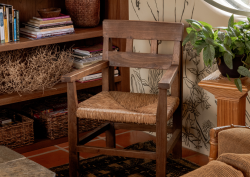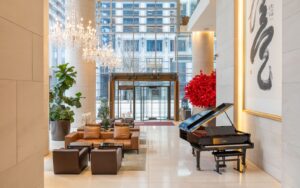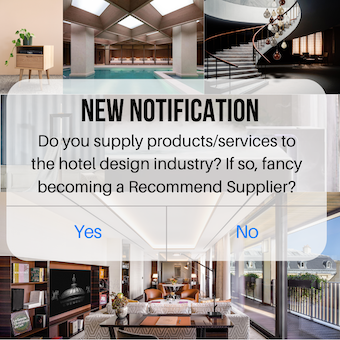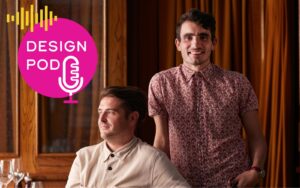What is a bespoke environment, and how do you create a unique guest experience? Sit down with Hotel Designs and BoConcept as we asked 10 design industry specialists just that, with answers ranging from installing a kinetic ceiling to designing a sea view-less beach resort (yes, really!)…

In an ever-evolving hospitality landscape, crafting bespoke environments is no longer a luxury – it’s an expectation.
With that in mind, in this latest roundtable discussion, hosted by Hotel Designs in collaboration with BoConcept, at the Scandi-brand’s recently refurbished showroom on Tottenham Court Road, a panel of leading designers and creatives explored what it truly means to create a ‘bespoke experience’ for hospitality guests.

The experts from left to right: Christina Gregoriou, Partner at Michaelis Boyd; Clare McDonald, Creative Director at Design Command; David Harte, Partner & Co-Head of Interiors at Studio Moren; Gina Scigliano, Head of Brand & PR, Casa Collective; Karen Taylor, Founder and Creative Director at Pattern Haus; Kathryn Quinn, Senior Designer at Goddard Littlefair; Mathilde Le Villain, Founder at LA VILLAINE; Michael Effenberger, Head of Business Development at BoConcept; Michel Baumgart, Commercial Director at BoConcept UK; Pennie Dawes, Senior Designer at AvroKO.
From sensory design and intuitive spatial flow to collaborations with operations teams and brand alignment, the conversation delves into the philosophies, challenges, and successes behind building spaces that resonate deeply with guests, design enthusiasts, and local communities alike.
Sophie Harper: I think the first question has to be, what does creating bespoke experiences or unique experiences for hotel guests mean to you?
Karen Taylor: Bespoke can mean tailor-made or customised, which really means unique. And to create that, you need to have a very deep understanding of the brand, the target market, the target demographics; of the space you’re going into, the history of the building, the area, the country, and I think it’s only then that things can be truly unique and bespoke.
Mathilde Le Villain: It’s also about bringing the emotion, which is very important. How do you make a room in a hotel look like it has always been a part of it and it’s not part of a beautiful furniture shop that you have taken and just dropped there? And that’s when it becomes bespoke.
“We are the directors to someone’s experience…what they see, what they smell, what they touch”
Christina Gregoriou: The reason hospitality design is so special is that we are the directors to someone’s experience; how they experience the space, what is their flow within the space, what they see, what they smell, what they touch… And that’s where emotion and soul comes from.
Michel Baumgart: Do you think sound is sometimes undervalued when creating bespoke spaces?
Mathilde: The sound is important: not just what you do hear, but what you don’t hear – how the sound is absorbed.
Gina Scigliano: Similarly with lighting as well. Sometimes rooms are very dimly lit, which is perfect for certain scenarios and times of day. But if you’re getting ready, it’s the last thing you want. So I think it’s also being able to adapt it to the time of day and the needs of the guests as well.

Pennie Dawes: But also, the usability of that lighting as well. I was doing socket placement yesterday and I had my eyes shut and I was walking around the room thinking, right, I open this door, where do I intrinsically think the switch should be for the next room?
And it’s just making sure that people can find what they want. You know, you wake up in the middle of the night, you don’t want to suddenly turn on all the lighting, perhaps, or wake up your partner with a noisy door or whatever, because you’re not quite sure where you’re going because the layout makes no sense.
Sophie: So a space should be intuitive, right? Everything you find in any kind of space, not just a guest room, should be intuitive or effortless.
Pennie: That’s where bespoke comes in, it is thinking intuitively about how a participant uses space, where they would expect things to be and what they expect to have as an experience as well.
“You can have a repetition of service and expectation. But if a brand wants a repetition of a design, then their brand will not last for long”
Mathilde: The understanding of human behaviour in general is very important; working with the operation team can really help because they will know their customer and their expectation as well.
Pennie: The number one thing we want to do in a hotel is make people feel safe and comfortable in their room. At AvroKO we have what we call ‘hospitable thinking’, and the first thing is that everyone needs security.
Karen: You don’t want a design to intimidate a guest.
Michael Effenberger : So, what level of bespoke are you looking for? Are there situations where you try to make it bespoke to individual users on individual visits?
Clare McDonald: I stayed somewhere and was asked in advance what I wanted in the minibar, so that was a nice ‘bespoke’ element that was tailored for an individual user. But in terms of bespoke design, if we’re not being bespoke, we’re not designing; any way that you’ve laid out a space and forged the way the person moves throughout that space is bespoke.
Pennie: We’re increasingly being asked by clients: how will the space be different in the evening? How will the F&B spaces differ from lunch and dinner? We’ve got one design at the moment that includes a kinetic-moving ceiling that changes the entire ambience of the space – so it is completely bespoke.
Sophie: Service plays a massive part in guest experience too. So do any of you work with the operations teams to figure out how best to design a space?
Christina: You can’t design anything without talking to the ops teams. They know so much and picking their brains is so important because they also have the vision of how they want the experience to be.
Michel: When you’re working for bigger brands, how do you create a bespoke design and unique experience within the parameter of a brand?
Kathryn Quinn: You can have a repetition of service and expectation. But if a brand wants a repetition of a design, then their brand will not last for long. Because no one wants to see the same thing again and again and again. So I think every brand has that desire to always push the boundaries. Or always do something different – or bespoke.
David Harte: Guests won’t accept that same design anymore. Especially when you’re talking about upscale luxury properties.
Sometimes it’s the finer details that really define a brand – or having all the things you expect to have in that hotel if you’ve stayed in five of that brand before. Like, making sure you’ve got the bedside drawer the right size.
Mathilde: You will have brand guidelines. You have some key elements – colours, textures – that are repeated, but they are used in different ways.
Depending on the properties’ locations, you might change the material, because your colour palette needs to be different. A certain colour palette in a warm country or in a colder country is not necessarily going to be the same, because the lighting is not the same. So that becomes bespoke.
“If we’re not being bespoke, we’re not designing”
Sophie: Can you give any examples of projects you’ve worked on where it’s been particularly challenging or particularly successful, delivering something really unique or out of the ordinary?
Christina: At the moment we are designing a beach resort without a sea view. The site is amazing, and is very close to the sea, but it’s on a cliff that drops right down, so you can’t actually see the sea. It’s one of those situations where creativity really comes in and so we’ve made it all about turning the views within and bringing other senses, like sound, into it.

Sophie: Can anyone top that? Has anyone had any particularly challenging projects where the payoff has been successful?
Pennie: When we did Revery Bar for Hilton on Park Lane, they didn’t want it to look like it’s part of the Hilton. So there was a huge amount of workshopping. The space is hugely angular, at the back end of the lobby, but they wanted it to feel like a secret space.
So we had to work with that and design it in a way where the acoustics were massively softened compared to the main lobby. We couldn’t create a partition or anything, but the way we designed it, it felt like you were slipping into the space rather than stepping into it.
Sophie: So sometimes it is the challenges which makes a design bespoke, and consequently the guest experience unique.
This rich and insightful conversation reaffirms that creating bespoke hospitality experiences is both an art and a science. As our panellists highlighted, the key lies in collaboration – between designers, clients, operations teams, and even guests – to ensure that every space feels intuitive, engaging, and alive. In today’s competitive landscape, truly bespoke design is not just about aesthetic excellence; it’s about crafting environments that invite people to feel – and want to stay again!
BoConcept is one of our Recommended Suppliers and regularly features in our Supplier News section of the website. If you are interested in becoming one of our Recommended Suppliers, please email Katy Phillips.
All image credits: Hotel Designs





























